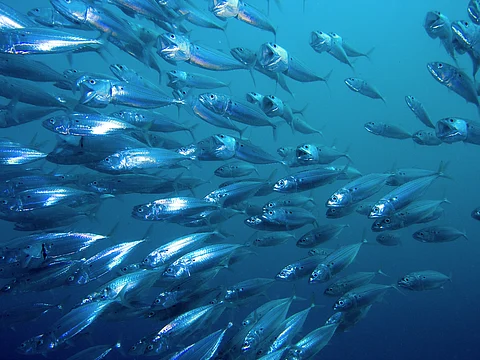

A school of mackerel.
Photo: Adobe Stock.
The North Atlantic Pelagic Advocacy Group (NAPA) has raised alarm over new scientific data showing that North East Atlantic mackerel has fallen to its lowest stock level in more than two decades.
The warning follows advice issued this week from the International Council for Exploration of the Seas (ICES), which says catches should be reduced by 77% compared to last year if the species is to recover, meaning a total catch limit of no more than 174,357 tonnes.
According to ICES, fishing pressure has consistently exceeded recommendations. Since 1998, catches have been higher than scientific advice every year except one, and over the last decade have averaged 33% above safe biological limits. NAPA said this long-term overfishing, coupled with unilateral quota setting by coastal states, has driven the decline not only in mackerel but also in Atlanto-Scandian herring and blue whiting.
NAPA, which represents more than 50 retailers, suppliers and food service companies, argues that the new data is further proof of the urgent need for international quota-sharing agreements. Without this, the group says, the health of fish stocks, seafood markets and the wider ecosystem remain at risk.
“The latest update on the state of the mackerel stock is shocking – but not surprising," said NAPA independent chair, Aoife Martin. "As the voice of the marketplace, NAPA has been calling for action to address this issue for five years. In that time, excess catches have totalled over 1 million tonnes above scientific advice. It has proven inevitable that there would be stark consequences not only for the species, but for all who depend on it for their livelihoods.”
NAPA is currently leading a Fishery Improvement Project (FIP) aimed at encouraging coastal states to reach a long-term sharing arrangement. The group says such a deal would be a step toward regaining the Marine Stewardship Council (MSC) certification that was withdrawn from the mackerel fishery in 2019.
In the meantime, NAPA is recommending interim measures such as capping high seas catches at 10% of the total, restricting the use of whole mackerel to human consumption, and limiting banking and borrowing of quotas.
Martin added that while recent discussions among coastal states show “willingness” to find common ground, “not yet any one proposal that all States endorse” has been reached. She warned that if meaningful progress is not made before the FIP ends in April 2026, many of NAPA’s partners may be forced to reconsider their sourcing strategies.
“Our Partners – from processors to distributors to retailers – are absolutely committed to seeing North East Atlantic mackerel return to its previous healthy state, and we will leave no stone unturned in our search for solutions,” she said.
“But we can’t wait forever. If Coastal States don’t deliver a comprehensive catch sharing agreement in the next 6 months, many of our Partners will be faced with difficult decisions about where they source product from," Martin warned.
